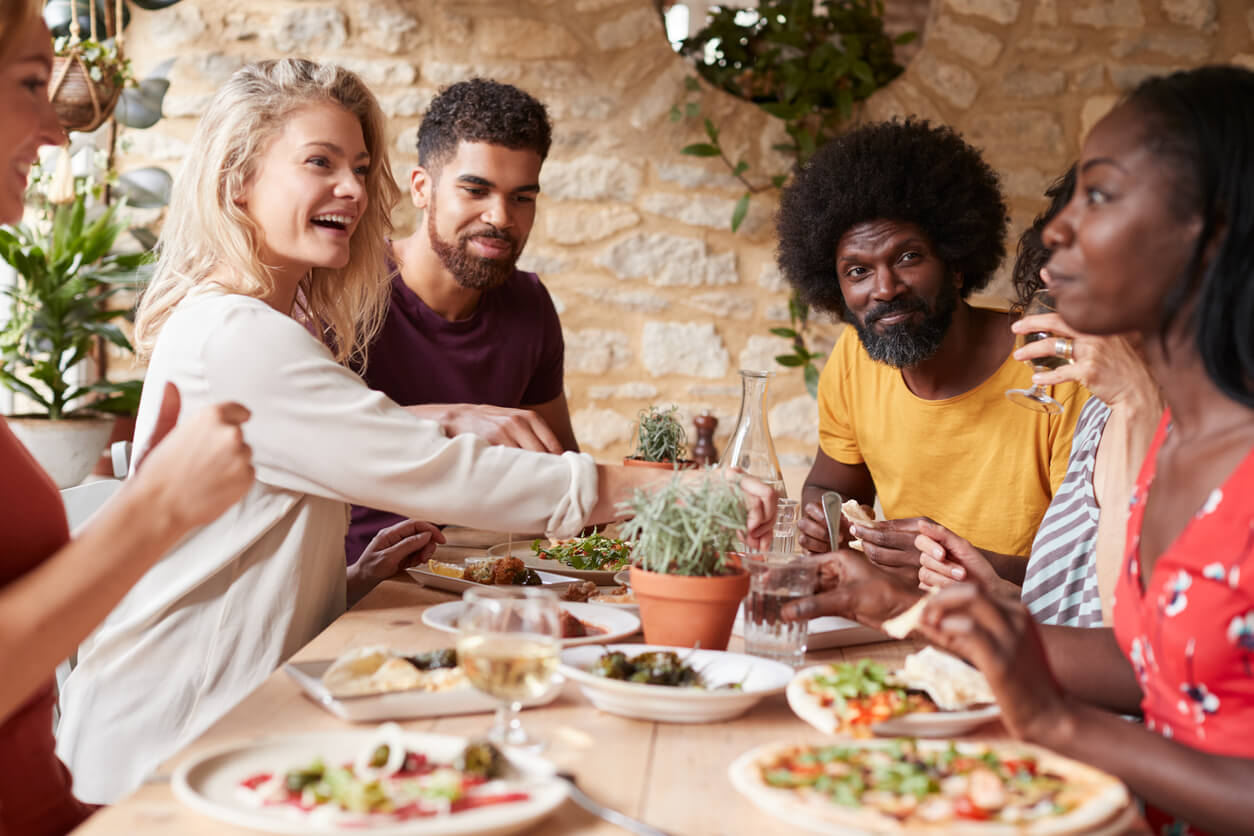When I was only nine years of age, my mother taught me an invaluable lesson about food.
She was barely 30 years old, yet her hands were already crippled with rheumatoid arthritis. My mother loved to play her accordion for my sister and me, and she often played the piano for her church. But her gnarled knuckles were becoming too deformed and stiff to hit the keys properly.
It was a deeply sad loss, but what could she do? No effective medical treatments for her condition existed at the time, so she was facing a lifetime of pain, and the further progression of this debilitating disease.
Though I was a young child at the time, the experience has stayed with me all these years. My mother’s determination to find a way to heal herself with food, at a time when our culture didn’t yet support that concept, moved and inspired me. She somehow managed to locate information about the health risks associated with sugar and white flour. None of her doctors had told her that halting the consumption of these products might heal her hands, yet she intuited that this might solve her problem. My mother stopped eating all sugar and white flour then and there.
Miraculously, her rheumatoid arthritis disappeared. Now, I am in no way claiming that abstaining from white flour and sugar can heal all cases of rheumatoid arthritis. But it proved useful in my mother’s case. She returned to playing the musical instruments that delighted her listeners, and I got my mother back.
I also never forgot the real-life lesson I received from her example: the quality of the food we eat can be a powerful predictor of our health.
Not Everyone Was Pleased
As a little girl, I noticed something else, too: my mother’s attention to what she put in her mouth and how it affected her health didn’t win her any popularity contests.
I was dumbfounded repeatedly by the way friends and family members would often ridicule her food choices.
“Oh, Elaine,” they’d say to her. “Don’t be so uptight. One bite isn’t going to kill you. Live a little. You’re too skinny anyway.”
Even though I was only a child, I couldn’t help but notice that the people insisting my mother eat like they ate were not as healthy as she was now. Some of them were overweight and in poor health.
Watching my mother’s hands heal, it seemed obvious to me that the way she was eating was working for her. And I wondered why these friends and family members couldn’t appreciate that. I was also confused by their feelings because it seemed like they were afraid of how she was eating.
I Wondered, What Were They So Afraid of?
As an adult, I now know that fear sometimes pops up when someone in your group is eating differently. And I know there can be several causes of that fear.
For instance, many people comfort themselves believing that their health problems are due to genetics and the natural aging process. Anything that challenges that belief can feel destabilizing.
Nevertheless, it is a fact that, although our health can indeed become more fraught as we age, there are a plethora of chronic health issues that have little to do with aging. Many chronic health conditions are the result of lifestyle choices like nutrition.
And it is also a fact that making lifestyle choices that can lead to better health can also create issues in some social situations — and even in our homes with family members.
Healthy Boundaries, Healthy Connections

Have you ever had an experience like my mother had, seeking to have a healthy diet and being met with emotional and social resistance? Have you ever had the experience of making a dietary change that was important to you, only to be met with opposition from friends or family?
I am a relationship coach, and I teach my clients how to assert healthy boundaries while creating heart connections. After all, we all want connection. And, we also want to feel that our choices are respected.
Yet, we sometimes feel that we can’t have both. With certain friends or family members, we might feel that we can’t have connection if we also want our choices to be respected. So we may end up “going along to get along.”
Have you ever eaten something you really didn’t want to, just because someone nagged you into it? Maybe they “begged” you to try a dessert they made “especially for you”? Or they convinced you to share a side dish they wanted to order from the menu? Perhaps a friend invited you to their home for the holidays, and you felt it would be rude to refuse something they spent hours preparing?
If so, you sure aren’t alone. I, and so many others, have encountered these and other scenarios that seem to impose a double bind that asks us to choose between caring for our health or nurturing our connections. It can seem like we can’t do both.
As a relationship coach, I’m here to tell you that you do not have to make that false choice. In far more of these situations than you might realize, effective ways to nurture your relationships while caring for your health do exist.
Interested? Read on!
Bringing in Empathy and Compassion

First, let’s talk about the fears your friends and family may be experiencing. This is an important step because the more you understand what they might be feeling, the more empathy and compassion you can have for them, and the more emotional intelligence you can bring to these sometimes awkward and tense situations.
Here’s a list of things that create comfort for most people. When these are threatened, fear often ensues:
Stability
We humans like things to stay the same. But if you are changing how you eat, that in itself can evoke fear. It’s not so much a conscious thing as a subconscious desire for stability. The truth is that our friends and family often want us to remain the same. And whether your loved ones know it or not, when you change how you eat, it can also trigger a larger fear. They may be afraid that you will change in some other way too.
Bonding
In the past, you probably ate more like your friends and family — at least when you gathered together. But if you aren’t eating what they eat anymore, that can feel alienating for them. A lot of folks feel closer when they share food. If you aren’t eating the same foods, they may not feel as close to you as they did. And that can feel scary.
Acceptance
The people you hang out with likely share your values. Yes, your friends and your family can be diverse. But there is usually enough similarity to help you feel like you are from the same tribe, at least to some extent. Even if you differ around religion or politics, you probably still laugh about some of the same things or share memories you enjoy revisiting. And the less you agree about those weightier topics, the more importance you might place on “breaking bread” together in order to feel connected. Needless to say, the greater disparity in beliefs and lifestyles, the more charged emotions can become around food differences.
Given that your friends and loved ones might react with fear to your healthier choices because they worry you’ll change too much, pull away from them, or judge them for what they eat, it’s only natural for you to want to protect yourself from their negative responses.
Here, then, is the question I think is critical to ask: Is there a way you can successfully address the fears your loved ones may have, while also maintaining your boundaries and upholding your dietary choices?
Strategies That Can Help

While it may not always be easy, there are strategies that can help you navigate your loved ones’ concerns while maintaining healthy dietary choices. I’ve utilized these strategies countless times. And they work! Here are some ways you can stick to your diet at social gatherings:
1. Redirect attention away from the food and onto your shared memories.
Express gratitude for meaningful life events you’ve shared, and remind your loved ones of those things you hold in common. If someone is feeling destabilized by the shifts you’re making, reminiscing together about shared life events can help maintain stability by bringing to mind your common history.
2. Show interest in them.
Instead of talking about what’s on the menu, talk about what is most meaningful for your loved ones. Ask plenty of questions about their current passions and challenges. Practice curiosity, active listening, and empathy. If someone is afraid that your dietary shifts will make them feel less bonded to you, connecting to them in a deeply personal way will help allay those concerns. And be sure to share something about your current passions or pursuits (other than food), too. Bonding thrives with reciprocity.
3. Talk about some of the many things you appreciate about your friend or family member.
Recall something special your friend or family member did that impressed or moved you. Tell them what they’ve done that you’re grateful for. Or highlight one of their accomplishments that stands out for you. This can alleviate any sensations of alienation and create more connection by showing that you accept and appreciate them.
You CAN Have a Healthy Diet & Maintain Social Connection

In our culture, we eat for many reasons. And sometimes eating the same food becomes a symbol of our caring for each other. While eating food together can be a way to share caring and create connection, it isn’t the only way. This is exactly why it’s important to know that you can stay on your healthy eating path while also leading the way to more of the life-affirming things we all crave — and the very things your family members are afraid they might be losing when you make healthier food choices. You can lead the way to more love, acceptance, connection, and bonding.
Of course, some of your family members and friends may resist even your most loving efforts. If that happens, you can still hold them in your heart with love. You can accept them as they are, remembering that each of us is ultimately responsible for our choices, and you can’t control what others think about you or what they choose to do — especially what they choose to eat.
If you approach social situations with curiosity and compassion for yourself and others, you will be helping to create a more loving world for all of us. Getting healthy includes nurturing your social connections. And you don’t have to give up your standards to do it.
Here’s to having a healthy diet while also enjoying the social events that feed your soul.
Tell us in the comments:
- Have you ever found yourself in a “go along to get along” situation? What did you learn from it?
- What has been most helpful to you in sustaining important relationships once you started eating a new way?
- In what ways have your relationships grown as a result of shifting the focus from food to other aspects of connection?
Feature image: iStock.com/Geber86




